 |
|
German, Slav and Magyar
A Study in the Origins
of the Great War
by
R. W. Seton-Watson
|
|
 |
|
This is
the 1916 First Edition
“There are three
stages in the Pan-German plan : (1) The creation of " Mitteleuropa," a great Central European state-organism of 130 to
150 million inhabitants, as an economic and military unit ; (2)
the realization of the dream Berlin-Bagdad, by the inclusion in
the political and economic spheres of influence of the new
Zollverein of all the territory lying between the Hungarian
frontier and the Persian Gulf ; and (3) naval supremacy and
Weltmacht.”
“. . . the real urgent
menace from Germany has been, to a large extent,
overlooked by our public opinion or merely alluded
to in passing. This menace lies in the fact that
Germany controls the destinies of the 51,000,000 who
inhabit the Austro-Hungarian Monarchy to say nothing
of the 20,000,000 of Turkey and the 4,000,000 of
Bulgaria and is ruthlessly exploiting them in a
cause which the vast majority of them regard with
complete indifference, and at least half of them
with utter loathing. Just as the harmless Anatolian
peasant is fighting the battles of Enver Pasha the
murderer of his commander-in-chief, his Grand
Vizier, and now his Heir-Apparent so the 35,000,000
Slavs and Latins of the Central Empires are being
used as ‘food for cannon’ in a death-struggle
against their own kinsmen and their dearest national
ideals.”
|
 |
|
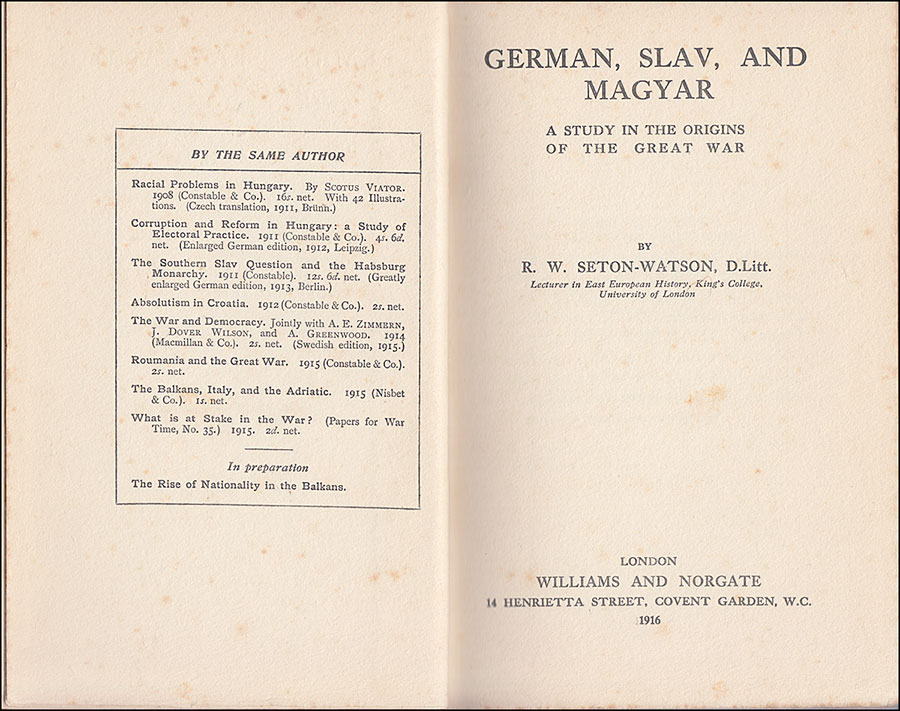
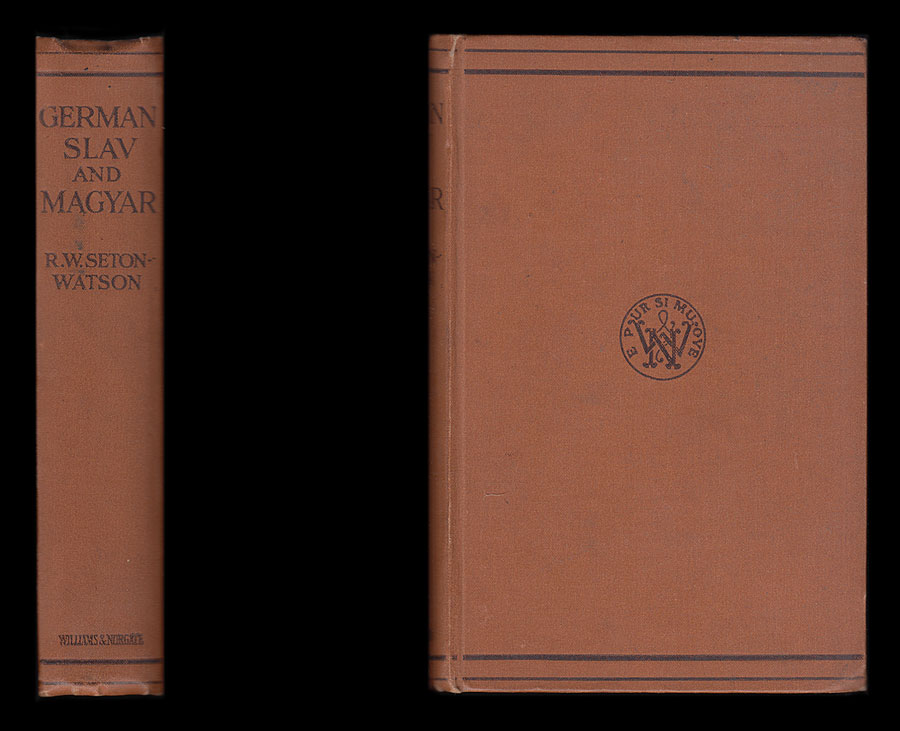
Front cover and spine
Further images of this book are
shown below
|
|
 |
|
 |
 |
|
|
|
Publisher and place of
publication |
|
Dimensions in inches (to
the nearest quarter-inch) |
|
London: Williams and Norgate |
|
4¾ inches wide x 7¾ inches tall |
| |
|
|
|
Edition |
|
Length |
|
1916 First Edition |
|
198 pages + Publisher’s advertisement |
| |
|
|
|
Condition of covers |
|
Internal condition |
|
Original brown cloth blocked in black. The
covers are scuffed and rubbed, with evidence of old staining, which is more
apparent on the rear cover. The spine has faded and is quite dull and is
also slightly stained. The spine ends and corners are bumped and slightly
frayed. There is a forward spine lean. |
|
The end-papers are browned and discoloured and
there is a very small "Times Book Club" sticker on the rear pastedown. There
is scattered foxing which is more noticeable at the start and end. The paper
has significantly tanned with age though the text is generally clean
throughout. The edge of the text block is grubby, dust-stained and foxed,
with the foxing extending into the margins. The underside edge of the text
block is not uniformly trimmed and is ragged in places. |
| |
|
|
|
Dust-jacket present? |
|
Other
comments |
|
No |
|
Overall, a good solid example of the First
Edition with mainly age-related defects, including dull covers,
tanned paper and scattered foxing. |
| |
|
|
|
Illustrations,
maps, etc |
|
Contents |
|
No Illustrations are called
for; there are two maps (both shown below) |
|
Please see below for details |
| |
|
|
|
Post & shipping
information |
|
Payment options |
|
The packed weight is approximately
600 grams.
Full shipping/postage information is
provided in a panel
at the end of this listing.
 |
|
Payment options
:
-
UK buyers: cheque (in
GBP), debit card, credit card (Visa, MasterCard but
not Amex), PayPal
-
International buyers: credit card
(Visa, MasterCard but not Amex), PayPal
Full payment information is provided in a
panel at the end of this listing. |
|
|
 |
|
  |
|
 |
 |
|
German, Slav and Magyar
Contents
Part I
Austria-Hungary and the Southern Slavs
I. The Dual Monarchy
II. The Hungarian Constitution
III. Magyar Racial Policy
IV. The Genesis of Serbia
V. The Idea of Southern Slav Unity
Part II
The Pan-German Plan
VI. “Central Europe” and “Berlin-Bagdad”
VII. Bohemia as a Rampart Against Pan-Germanism
VIII. The Pan-German Plan and Its Antidote
Bibliography
Index
Maps
The New Europe, on a Basis of Nationality
“Mitteleuropa”
|
|
 |
 |
|
German, Slav and Magyar
Prefatory Note
THIS little volume is based in the
main upon lectures delivered at the London School of Economics, at
University College, London, and at the Royal Society of Arts. Most
of Chapter VI has already appeared in the Journal of the latter
Society, while the germ of the concluding chapter is to be found in
my " What is at Stake in the War " (No. 35 of Papers for War Time),
published in June 1915, and in an article in the Contemporary Review
for April.
R. W. S.-W.
May 1, 1916.
|
|
 |
 |
|
German, Slav and Magyar
Excerpt:
VI. “Central Europe” and
“Berlin-Bagdad”
IT has become a commonplace of writers
on the war to say that Germany is a danger to Europe. In a sense
this is of course true, but it gives a wrong focus to the truth. For
no nation, so long as it is content with its national unity and
independence and the development of its own resources and culture,
can fairly be described as a menace to its neighbours. That stage is
only reached when it begins to regard its own civilization as a
species of super-culture, and its leaders as supermen who have the
mission of imposing their wishes and ideas upon the outside world.
It is not, then, Germany, as Germany, that threatens Europe's whole
future. There have been cases before in history, when a great nation
went mad for a time and yet recovered from its madness. The classic
example is that of our nearest and dearest allies, the French,
during the orgies of the Reign of Terror. And it may be that in the
same way Germany will recover from the madness which has devastated
Belgium, Poland, and Serbia, and that some intercourse between her
and her neighbours to the West and East will again be possible. At a
moment when her submarines and Zeppelins are murdering at random,
and her soldiers are drugged with ether for the assault, this may
appear little better than a pious hope.
But to-day the essential fact with which we hare to reckon is that
Germany is more united than ever before, and that the classes which
control her destinies not merely the narrow military clique at the
top, but the whole vast organism of the bureaucracy, army, and
professional and academic classes are inspired by a programme which
may be summed up in three words Deutschland uber Alles. Fortunately
this has at last become too obvious to be ignored, and is, indeed,
only contested by a few cranks, who have been far too often wrong in
their estimates and prophecies to obtain credence now. Strangely
enough, however, the real urgent menace from Germany has been, to a
large extent, overlooked by our public opinion or merely alluded to
in passing. This menace lies in the fact that Germany controls the
destinies of the 51,000,000 who inhabit the Austro-Hungarian
Monarchy to say nothing of the 20,000,000 of Turkey and the
4,000,000 of Bulgaria and is ruthlessly exploiting them in a cause
which the vast majority of them regard with complete indifference,
and at least half of them with utter loathing. Just as the harmless
Anatolian peasant is fighting the battles of Enver Pasha the
murderer of his commander-in-chief, his Grand Vizier, and now his
Heir-Apparent so the 35,000,000 Slavs and Latins of the Central
Empires are being used as " food for cannon " in a death-struggle
against their own kinsmen and their dearest national ideals. Thus
the main task before us, if we are really to reconstruct Europe on
new and healthy lines, must be to detach these peoples from their
present thraldom to Berlin, Vienna, and Budapest, to liberate the
Slav democracies of Central Europe, and to secure to them the means
of progress and organization upon a national and independent basis.
This task has the further military advantage that it enables us to
attack Germany at her weakest, and no longer at her strongest, spot
; for the events of the war have only served to prove that some of
the leading French strategists were right in maintaining that the
true field for a successful offensive lies through the great
Hungarian plains, not through the brick walls of Belgium. By our
planlessness and levity we have abandoned the magnificent natural
frontier from the Adriatic to the Danube, which was at our disposal
for the first fourteen months of the war, and we did not even take
the trouble to defend Mount Lovcen, the key of the Adriatic, from
the assaults of Austria. But though our folly has made the task
infinitely more difficult, it still lies before us. If to the
conquering Germans last autumn Serbia was the route to the East, she
is also the route to the West for the Allied armies.
Before the war in Germany, as in all other European countries, our
own included, there were two currents of opinion, the one definitely
opposed to adventure or expansion, the other as definitely basing
itself upon force as the root of all progress. No one who visited
Germany frequently, or was in the habit of reading German political
literature, could fail to be aware of the existence of an active
Pan-German movement and of a propaganda which often assumed an
anti-British complexion. Our mistake lay in over-estimating the
strength of those saner forces in German public opinion which made
for peace. At the end of July 1914 those forces proved themselves to
be utterly impotent, and were swept away by the march of events. The
inevitable result has been to bring the Pan-German programme within
the range of practical politics and to increase immensely its appeal
and its popularity. It may be argued that we were always wrong to
ignore its significance ; to-day our most vital interests demand
that we should study it in all its bearings.
There are three stages in the Pan-German plan : (1) The creation of
" Mitteleuropa," a great Central European state-organism of 130 to
150 million inhabitants, as an economic and military unit ; (2) the
realization of the dream Berlin-Bagdad, by the inclusion in the
political and economic spheres of influence of the new Zollverein of
all the territory lying between the Hungarian frontier and the
Persian Gulf ; and (3) naval supremacy and Weltmacht. The vital
problem of this war, upon which the whole future development of
civilization depends, is whether we are to oppose this programme or
to submit to it as inevitable. At such a moment there can be no
half-measures ; the answer must be yes or no. If no, this war is an
act of criminal folly which has no parallel in history. If yes, we
must not wait till the enemy's plan has reached maturity, but must
overthrow it in its initial stages. It was a German poet who told us
that what we have inherited from our ancestors we must earn again in
order to possess (Was du crerbt von deinen Vdtern hast, erwirb es,
um es zu besitzen). That is a lesson which we have been in danger of
forgetting, and which Germany is teaching us. For the future we must
throw off the insularity which left us ignorant or oblivious of
hostile designs, nor must we ever allow a situation to arise in
which we might seem indifferent to events upon land, simply because
they take place at the other end of Europe. For such indifference is
the surest way to alienate our Allies, who realize to the full the
close interconnection of West and East and Southeast, and expect us
to realize it equally. If we are right in regarding sea power as the
key to victory, it is none the less true that the extension of
German land power will be the prelude to a fresh attempt to
challenge our security on the sea. That is, of course, the true
inward explanation of the presence of British armies upon French
soil ; but while every one to-day realizes the need of countering
the German land plan on the West, the equally urgent and
overwhelming need of countering the Germans in the East of Europe
has still not been sufficiently realized. There are still quite
serious and well-meaning people who argue that if the Germans could
once be ejected from Belgium and Northern France, our aims in the
war would be achieved. To them all the vast problems of Central and
Eastern Europe are a mere blank. In seeking to differentiate between
Germany and her Allies, they fail to realize the fact that it is no
mere accident that has brought Prussia, Hungary, Turkey, and
Bulgaria into line. All four stand for the same principle of racial
hegemony. The only difference lies in the varying degree of
crudeness with which that policy is pursued in Posen, in
Transylvania, in the Balkans, and in Armenia.
If the German plan of "Berlin-Bagdad" is to be countered, we must
find obstacles to place in its path, and in so doing we can only
build with the material which is already to our hand. This consists,
above all, of the Slav and Latin peoples of Austria-Hungary and
South-eastern Europe generally, who are eager to lead their own
national lives, and the fulfilment of whose aspirations coincides
absolutely with British interests and the interests of the Entente
as a whole. Till the very eve of war, and even later, it was the
fashion in certain circles to regret our political ties with Russia
on the ground that the Slavs are barbarous. It would be as easy as
it is superfluous to prove that the Russians, the greatest of all
the Slav nations, are anything but barbarous, and that they have
much to teach us all above all, the Kulturvolk pat excellence in
every branch of science, art, literature, and music. But my present
object is to emphasize that it is an equally gross libel, and in
some directions an even grosser libel, upon the other Slav nations
also. The next two in importance, the Poles and the Czechs, far from
being barbarous, have ancient cultures and literatures of their own,
and have played a notable part in European thought and progress. The
Slovaks are perhaps the most attractive and naturally gifted of all
the Slav nations, and only await the removal of the tyrannous Magyar
yoke in order to reveal their latent talents to the world at large.
The Serbs and their Croat and Slovene kinsmen, the three branches of
the Jugoslav race, are also noticeable, not only for their heroic
endurance against fearful odds, but above all for the virile
perseverance which has created, without external aid, the most
democratic of peasant states in modern times.
One further point deserves special emphasis in this connection,
namely, the essential error which underlay our diplomacy in the
years preceding the war, in treating the Balkans and AustriaHungary
as two watertight compartments. It lies quite outside my present
purpose to describe the process by which the Germany of the
Burschenschaften and Turnvereine, of the Romantic Era in literature,
and of liberalism in the Swabian and South German form, was
transformed by the genius of Bismarck and his group into the
Prussianized Germany against which we are pitted to-day, and which
rests upon the material doctrines of blood and iron, and of brute
force as the sure forerunner of national prosperity. During the
generation which separated the Congress of Vienna from the
Revolution of 1848, the aspirations of the leaders of German thought
were directed, at one and the same time, towards national unity and
constitutional liberty and reform. But the reform movement was
shipwrecked at Frankfurt in 1848. Unity was only possible on a
unitary basis. Two masters were impossible ; either Prussia or
Austria had to give way. The idealists of Frankfurt dreamed of a "
Great Germany," the Germany of 70,000,000, as they reckoned even
then. But the inclusion of Austria with her non-German elements
would have created a dangerous dualism and prolonged still further
the rivalry of Habsburg and Hohenzollern. Bismarck achieved German
unity on rather narrower lines by the elimination of Austria. He
achieved it in seven years by three successive wars of aggression,
in which appearances were carefully preserved till long after the
event. But for his remaining twenty years of office, with the
notorious exception of 1875, when he was within an ace of attacking
France once more, he favoured peaceful development, and posed as the
peacemaker and honest broker. Nor was this a mere pose, and there
are no grounds for doubting his sincerity when he applied the famous
phrase " satiated " (saturierf) to the territorial appetites of
Germany, and when he declared that the whole Eastern Question was
not worth the bones of a single Pomeranian grenadier. The modern
German tendency to repudiate his attitude in this respect has
obscured the extremely subtle nature of his policy. The same
attitude which, in the Austro-Prussian War of 1866, made him lie in
despair upon his bed and tear the bedclothes with his teeth when his
master wanted to annex Bohemia, was reflected in the memorandum
which he addressed to William I in 1871, to the effect that it was
far more advantageous for Germany to extend her influence over the
Slavs through the medium of Austria than to annex the German
subjects of the House of Habsburg. A whole volume could easily be
devoted to a discussion of his motives in 1866, in suggesting that
Budapest was a better centre than Vienna for the reconstruction of
the Dual Monarchy. But it is quite clear that he aimed at the
political organization of Austria-Hungary as an instrument of German
policy ; and with that aim always in view the Czechs were isolated,
the Poles discreetly held in check, and the Magyars flattered and
encouraged. So firmly persuaded was Bismarck of Austria's value to
Germany, that when the Eastern Question separated Austria from
Russia and forced Bismarck to a decision, he chose Austria without
hesitation. Thus arose the Dual Alliance, which in 1882 became the
Triple Alliance. Throughout these years Bismarck favoured the league
of the three Emperors, and sometimes managed to attain it, though
never permanently ; and his leanings towards Russia, or the Tsarist
system, led him to conclude the famous Reinsurance Treaty (Ruckversicherungsvertrag)
. But determined as he was to remain on friendly terms with Russia,
he was never prepared to pay the price of deserting Austria.
Bismarck's aim, then, was slow infiltration. He once said to Hermann
Bahr, the novelist, who as a young man headed a deputation of
Austrian students, "that he was glad to see that the
German-Austrians were good Germans ; but that they could not prove
this better than by making Austria strong. Germany needed them and
reckoned upon them, but inside Austria" To-day we are beginning to
see the meaning of this policy. On a similar occasion, in 1895,
Bismarck said: "To prove effectually your sentiments towards the
German Emperor, fulfil all your duties towards your own dynasty. I
advise you to show condescension and indulgence to your Slav
neighbours." In the same way he steadily discouraged political
demonstrations directed against Austria, and in 1897 induced the
Reichstag to reject a motion of sympathy with the German
nationalists of Austria. In short, he desired a perpetual political
alliance between Germany and Austria, if possible, leading to a
Zollverein, but very possibly nothing more.
It is sometimes argued that because Germany's present-day ambitions
follow quite naturally out of Bismarck's policy, therefore Bismarck
was a Pan-German. That is as true and as false as to describe Drake
or Nelson as an Imperialist ; for every man lives in his own age. It
may be that his biographer, Erich Marcks, is right in claiming that
Bismarck would be heart and soul with his people in their struggle
to-day. But it is difficult to avoid the suspicion that Marcks and
many of his compatriots feel, in their heart of hearts, that
Bismarck would never have involved Germany in such a war. For to-day
Germany is fighting at one and the same time the three wars which
her Jingoes would have liked her to fight in succession the war
against Russia and Slavdom, for the domination of Middle Europe and
the Near East ; the war against France, to silence the promptings of
revanche and to win the mouths of the Scheldt and the Rhine ; and
the war against Britain, for sea power and world dominion. Bismarck
would certainly have taken them singly. There is another direction,
however, in which it is possible to trace the hand of Bismarck on
the tragedy of to-day, in his policy of the " strong hand " against
the Poles of Posen and Silesia. Despite his platonic advice to
Austrian students, he pursued an anti-Slav policy in the most acute
and irreconcilable form, and contrived to combine it with a firm
league with the Russian Court. Thus under Bismarck we find the
curious paradox of Petrograd, inspired by German influence,
following an anti-Slav policy in Poland, and thus weakening Russian
prestige in the Slavonic world. The Polish partition is the great
initial crime which lies at the root of all European troubles for a
hundred and fifty years past, and which has committed the three
spoilers to the support of an evil situation. Now that Russia has
broken with Germany, and is very slowly but noticeably preparing to
atone for the crimes of the past, we have the right to expect a
complete transformation of Russo-Polish relations, and consequently
of the whole situation between the Baltic and the Danube.
The eighties were a period of mild colonial expansion on the part of
Germany, but it was not until the accession of William II that the
new era can be said to have begun. Pan-Germanism raised its head and
kept pace with the tremendous outburst of economic activity and
material prosperity. Weltpolitik (world policy) became the new cry,
and William himself became its mouthpiece. In 1896, the year of the
Kruger telegram, he made one of his most memorable speeches : " Out
of the German Empire a world-empire has arisen. Everywhere in all
parts of the earth thousands of our countrymen reside. German
riches, German knowledge, German activity find their way across the
ocean. The duty devolves on you to help me to knit this Greater
German Empire close to the home country, by helping me in complete
unity to fulfil my duty also to the Germans in foreign parts." Thus
was inaugurated the new Imperialism. The motto of the Great Elector
" Remember that you are a German " (Gedenke dass du ein Deutscher
hist) became the motto of Emperor and people. What more natural and
estimable than this encouragement of national sentiment ? How could
we, who were at that very moment engaged in knitting our own Empire
more closely together, venture to criticize the Emperor's attitude ?
What more unexceptionable than William II's words, if they had been
pronounced by a man of normal temper and not accompanied by a whole
series of reactionary and arrogant utterances ? It is unnecessary to
go through the long catalogue. " Sic volo, sic jubeo" " Him who
opposes me I will crush." "Our future lies on the water." "The
trident must be in our hands." " The Emperor of the Atlantic greets
the Emperor of the Pacific." " Peoples of Europe, guard your holiest
possessions." " No quarter will be given, no prisoners will be
taken. . . . Open up once for all a way for Kultur." The last two
sentences, incredible as it may sound even to-day, belong to one and
the same speech. In William II's unbalanced imagination a glorious
ideal becomes raucous and rings false. The pure enthusiasm of the
patriot soldier-poet, Theodor von Korner, who apostrophized the
sword upon his thigh on the evening before he gave his life in the
War of Liberation of 1813, becomes the nauseous military sentiment
which makes the German Crown Prince proclaim his regret that a
cavalry charge at manoeuvres is not the "real thing."
The old idea that Germany is " satiated " comes to be more and more
keenly repudiated, not only by the Pan-German extremists, but by all
the sanest and most influential political writers. We hear more and
more of Kulturdunger (" the manure of culture ") ; of the crude
gospel of materialism ; of the doctrine of the superman and the "
strong hand " ; of the supreme morality of war ; of military
strategy as the basis of all political organism and of all
international frontiers ; of the theory that small states cannot
subsist and must inevitably become the prey of the great. That least
aggressive and greatest of all German writers, Goethe, once declared
that every man had the choice between becoming hammer or anvil. The
Pan-Germans caught up this phrase, and preached the view that after
being the anvil for centuries the German must insist upon becoming
the hammer. The essence of these modern doctrines may be summed up
in the teaching of Treitschke " the State is Power."
One of the main secrets of German success has been those habits of
association and co-operation to which their mediaeval cities owed
much of their prosperity. Just as the student societies played a
predominant part in the War of Liberation, so the eighties and
nineties which have led to the War of Hegemony, were a period of the
foundation of every kind of patriotic and political society. In 1880
the Deutsche Schulverein was founded in Vienna for the support of
German schools, and in the following year its namesake in Berlin was
established. The aims of these societies, which are still very
active, though perhaps slightly less powerful since the year 1895,
were by no means confined to preserving the German position in such
mixed districts as Bohemia, Silesia, Posen, Hungary, and Styria, but
also to propagating in the intensest manner possible the German idea
all along the non-German borderland. An older society, the Gustav-Adolf-Verein,
has devoted itself to the support of German Protestant congregations
in difficulties, and has done splendid work against Magyar
aggression ; but, despite its genuinely Protestant zeal, it must be
regarded as an eminently political organ. The three colonial
societies the German Colonial League, the German Colonial Society,
and the Society for German Colonization have all exercised a very
marked influence upon public opinion in Germany. The so-called
Schittzvereine (Leagues of Defence), which sprang up in every
direction throughout the Polish districts of Germany, the German and
mixed districts of Bohemia, and the countries lying between Vienna
and the Adriatic, have at one and the same time strengthened the
German element wherever it was forced upon the defensive, and
intensified the racial struggle by every kind of offensive tactics.
Above all, the notorious Deutsche Ostmarkenverein (1894), which has
acquired the nickname of the " Hakatist " League from the first
letter of the names of its three founders, Hansemann, Kennemann, and
Tiedemann, led a fierce and merciless attack upon everything Polish
schools, traditions, culture, religion and became the foremost
champion of the brutal policy of land expropriation pursued by the
Prussian Government.
There is, however, one society which has attained special notoriety
and which deserves fuller treatment, because though often poohpoohed
even by quite serious Germans before the war, and though always
ahead of German public opinion, and in deed, extravagant and
fantastic in its aims and utterances, it has, in this present war,
come into its own, and proved, not only to Germany but to all
Europe, that its vapourings and frenzy are not merely Utopian, but
Realpolitik of the grimmest kind. This is the PanGerman League,
which, first founded in 1886 by the notorious Dr. Carl Peters as the
Allgemeine Deutsche Verband, to encourage colonial expansion, was
transformed in 1895 by Dr. Hasse, the deputy for Leipzig, into the
Alldeutsche Verband. Its programme was one of expansion and
dominion, of the community of all branches of the German race (Gemeinschaft
alter deutscher Stdmme). It favoured the restoration of the ancient
frontiers of the mediaeval Empire, the redemption of all German
outposts at the expense of the enemy at the gates, the consolidation
of Central Europe on a Teutonic and at the same time on an economic
basis. It worked through perpetual meetings and agitation, and the
noisy cries of its platform orators were reflected in its official
organ, the Alldeutsche Blatter. It would be very easy even to-day to
exaggerate its influence in the years preceding the war. But it
certainly acted as a permanent stimulant to the Government,
especially in matters of emigration and colonial expansion. Above
all, it stirred up public opinion and accustomed it to think of
worldproblems which had hitherto lain outside the German ken. It
would not be accurate to assert that William II encouraged the
League, but he has always worked upon parallel lines. Another famous
speech, delivered in 1898, in which he urged "the unity and
co-operation of all the German tribes," aroused special enthusiasm
in Pan-German circles owing to its use of the central phrase in the
League's programme. The agitation of the Pan-German League
unquestionably paved the way for the first Navy Bill and popularized
the German fleet, especially in Bavaria and the south. Its programme
may be summed up under three main heads. No German must be
de-Germanized, or lost to his nationality ; the fleet must form the
link with all Germans overseas ; and an active Pan-German propaganda
must prepare the colonization of Central Europe . . .
|
|
 |
|
  |
 |
|

Please note: to avoid opening the book out, with the
risk of damaging the spine, some of the pages were slightly raised on the
inner edge when being scanned, which has resulted in some blurring to the
text and a
shadow on the inside edge of the final images. Colour reproduction is shown
as accurately as possible but please be aware that some colours
are difficult to scan and may result in a slight variation from
the colour shown below to the actual colour.
In line with eBay guidelines on picture sizes, some of the illustrations may
be shown enlarged for greater detail and clarity.





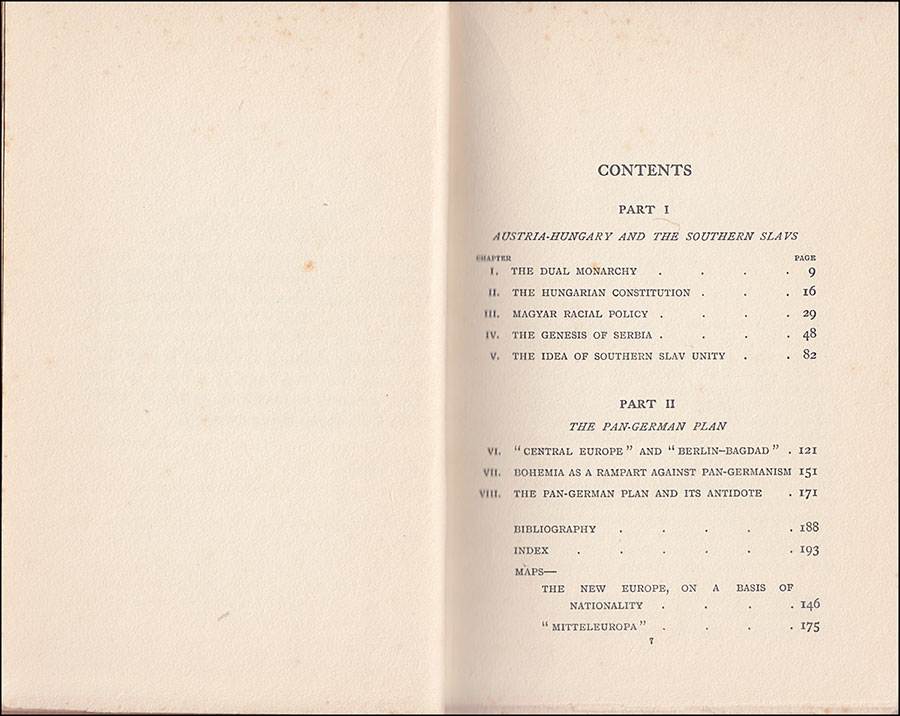
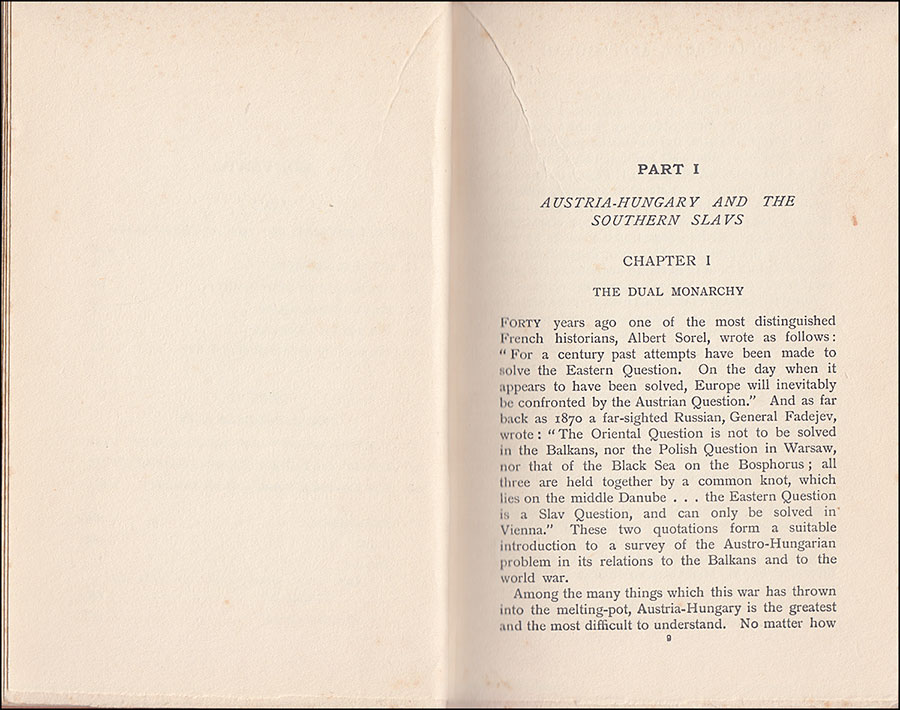
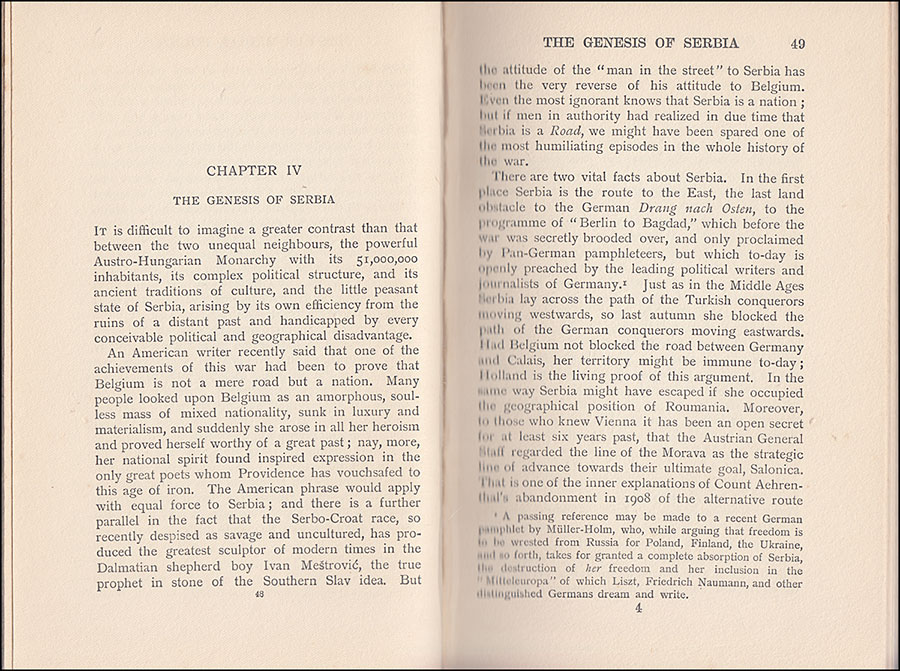
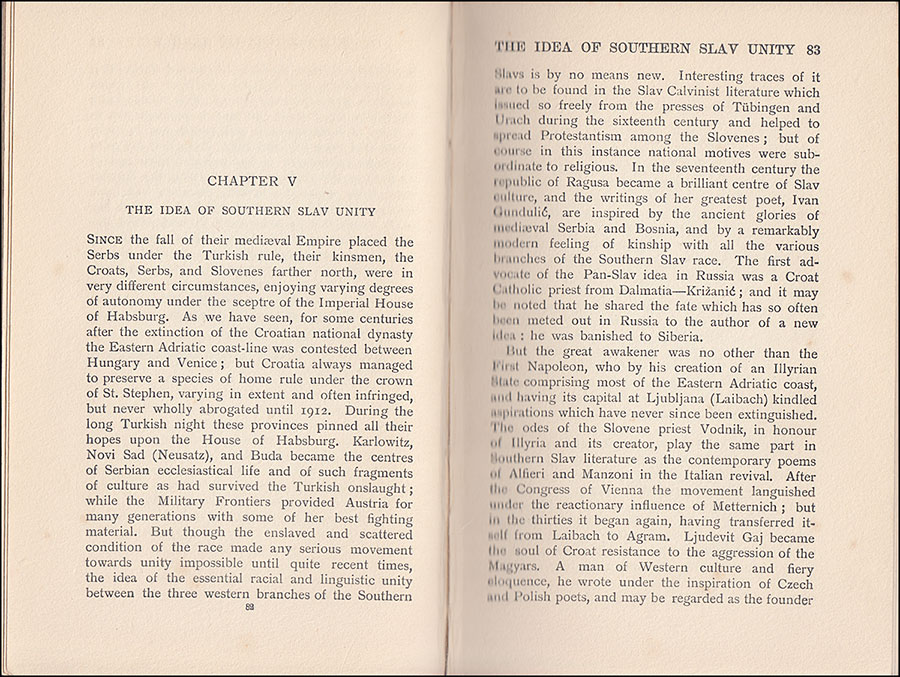
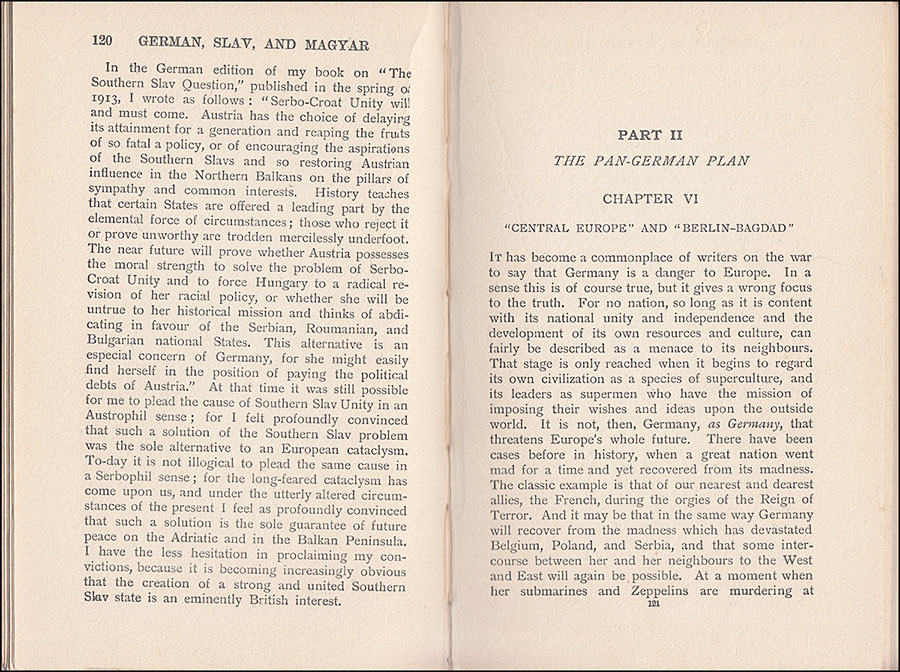
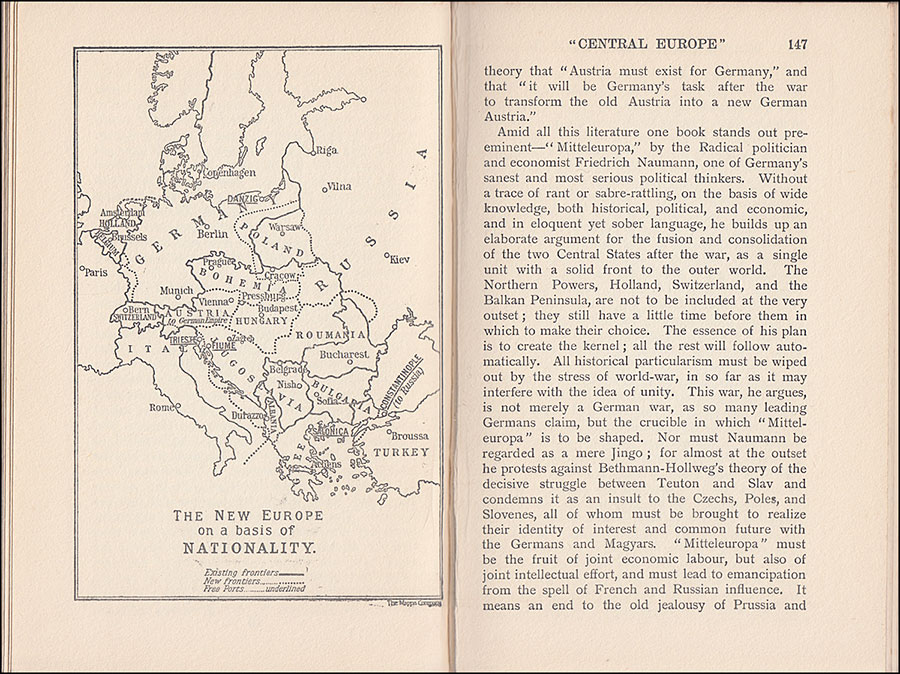
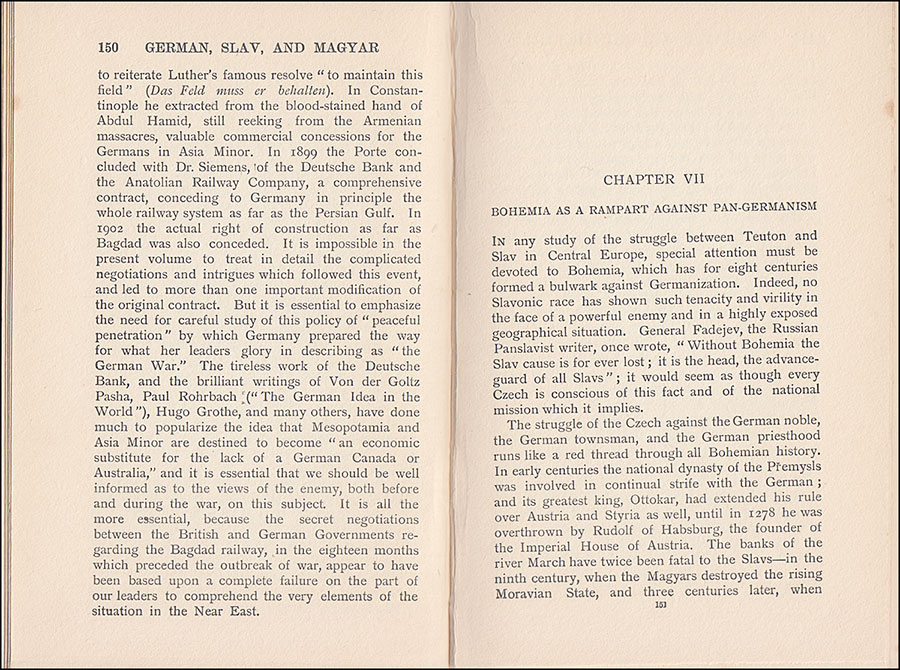
 |
|
 |
|
 

|
 |
|
U.K. buyers:
|
To estimate the
“packed
weight” each book is first weighed and then
an additional amount of 150 grams is added to allow for the packaging
material (all
books are securely wrapped and posted in a cardboard book-mailer).
The weight of the book and packaging is then rounded up to the
nearest hundred grams to arrive at the postage figure. I make no charge for packaging materials and
do not seek to profit
from postage and packaging. Postage can be combined for multiple purchases. |
Packed weight of this item : approximately 600 grams
|
Postage and payment options to U.K. addresses: |
-
Details of the various postage options can be obtained by selecting
the “Postage and payments” option at the head of this
listing (above).
-
Payment can be made by: debit card, credit
card (Visa or MasterCard, but not Amex), cheque (payable to
"G Miller", please), or PayPal.
-
Please contact me with name,
address and payment details within seven days of the end of the
listing;
otherwise I reserve the right to cancel the sale and re-list the item.
-
Finally, this should be an
enjoyable experience for both the buyer and seller and I hope
you will find me very easy to deal with. If you have a question
or query about any aspect (postage, payment, delivery options
and so on), please do not hesitate to contact me.
|
|
 |
 |
|
International
buyers:
|
To estimate the
“packed
weight” each book is first weighed and then
an additional amount of 150 grams is added to allow for the packaging
material (all
books are securely wrapped and posted in a cardboard book-mailer).
The weight of the book and packaging is then rounded up to the
nearest hundred grams to arrive at the shipping figure.
I make no charge for packaging materials and do not
seek to profit
from shipping and handling.
Shipping can
usually be combined for multiple purchases
(to a
maximum
of 5 kilograms in any one parcel with the exception of Canada, where
the limit is 2 kilograms). |
Packed weight of this item : approximately 600 grams
| International Shipping options: |
Details of the postage options
to various countries (via Air Mail) can be obtained by selecting
the “Postage and payments” option at the head of this listing
(above) and then selecting your country of residence from the drop-down
list. For destinations not shown or other requirements, please contact me before buying.
Due to the
extreme length of time now taken for deliveries, surface mail is no longer
a viable option and I am unable to offer it even in the case of heavy items.
I am afraid that I cannot make any exceptions to this rule.
|
Payment options for international buyers: |
-
Payment can be made by: credit card (Visa
or MasterCard, but not Amex) or PayPal. I can also accept a cheque in GBP [British
Pounds Sterling] but only if drawn on a major British bank.
-
Regretfully, due to extremely
high conversion charges, I CANNOT accept foreign currency : all payments
must be made in GBP [British Pounds Sterling]. This can be accomplished easily
using a credit card, which I am able to accept as I have a separate,
well-established business, or PayPal.
-
Please contact me with your name and address and payment details within
seven days of the end of the listing; otherwise I reserve the right to
cancel the sale and re-list the item.
-
Finally, this should be an enjoyable experience for
both the buyer and seller and I hope you will find me very easy to deal
with. If you have a question or query about any aspect (shipping,
payment, delivery options and so on), please do not hesitate to contact
me.
Prospective international
buyers should ensure that they are able to provide credit card details or
pay by PayPal within 7 days from the end of the listing (or inform me that
they will be sending a cheque in GBP drawn on a major British bank). Thank you.
|
|
 |
 |
|

(please note that the
book shown is for illustrative purposes only and forms no part of this
listing)

Book dimensions are given in
inches, to the nearest quarter-inch, in the format width x height.
Please
note that, to differentiate them from soft-covers and paperbacks, modern
hardbacks are still invariably described as being ‘cloth’ when they are, in
fact, predominantly bound in paper-covered boards pressed to resemble cloth. |
|
 |
 |
|

Fine Books for Fine Minds |
I value your custom (and my
feedback rating) but I am also a bibliophile : I want books to arrive in the
same condition in which they were dispatched. For this reason, all books are
securely wrapped in tissue and a protective covering and are
then posted in a cardboard container. If any book is
significantly not as
described, I will offer a full refund. Unless the
size of the book precludes this, hardback books with a dust-jacket are
usually provided with a clear film protective cover, while
hardback books without a dust-jacket are usually provided with a rigid clear cover.
The Royal Mail, in my experience, offers an excellent service, but things
can occasionally go wrong.
However, I believe it is my responsibility to guarantee delivery.
If any book is lost or damaged in transit, I will offer a full refund.
Thank you for looking.
|
|
 |
 |
|
Please also
view my other listings for
a range of interesting books
and feel free to contact me if you require any additional information


Design and content © Geoffrey Miller |
|
 |
|
|
|